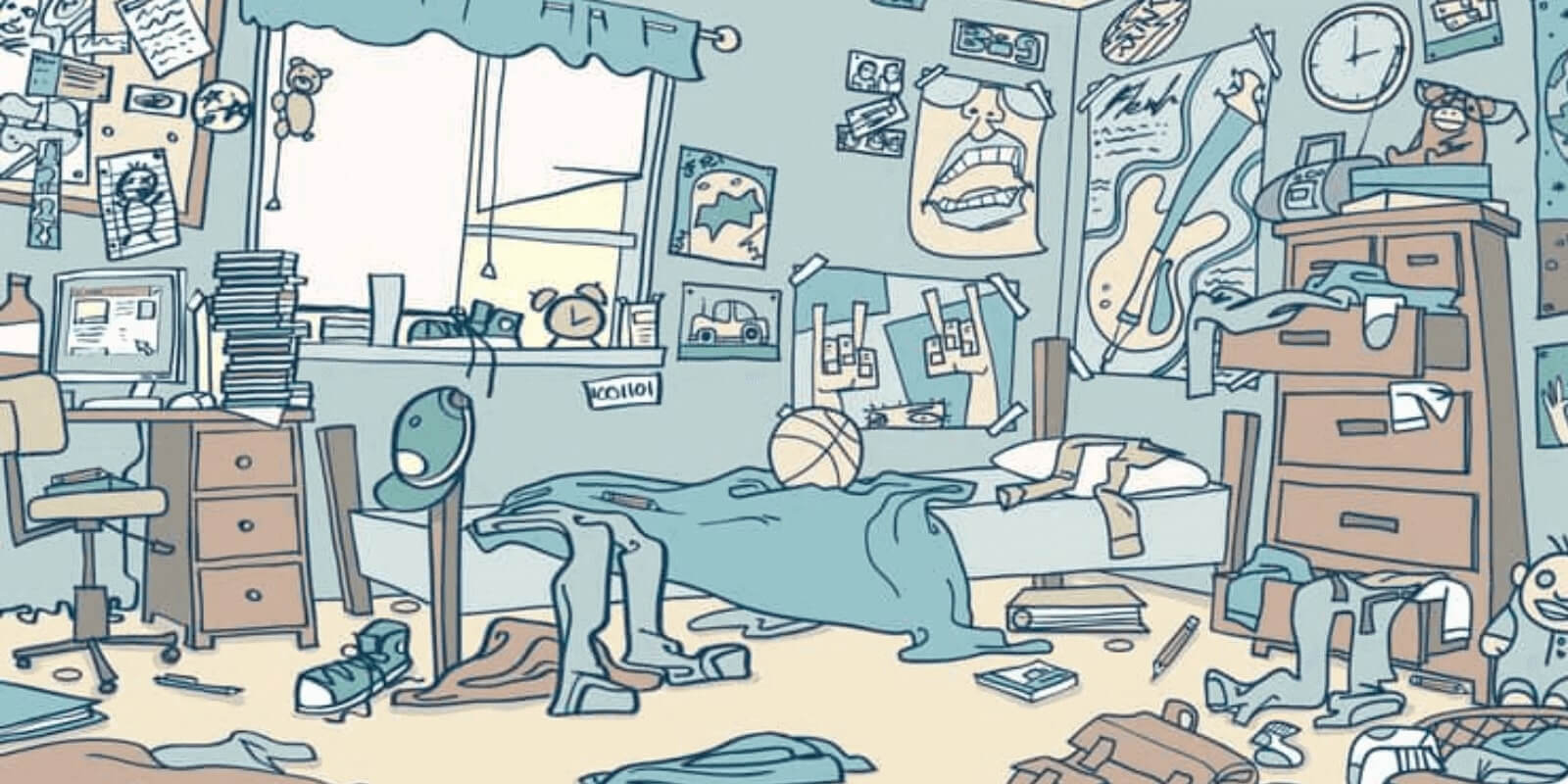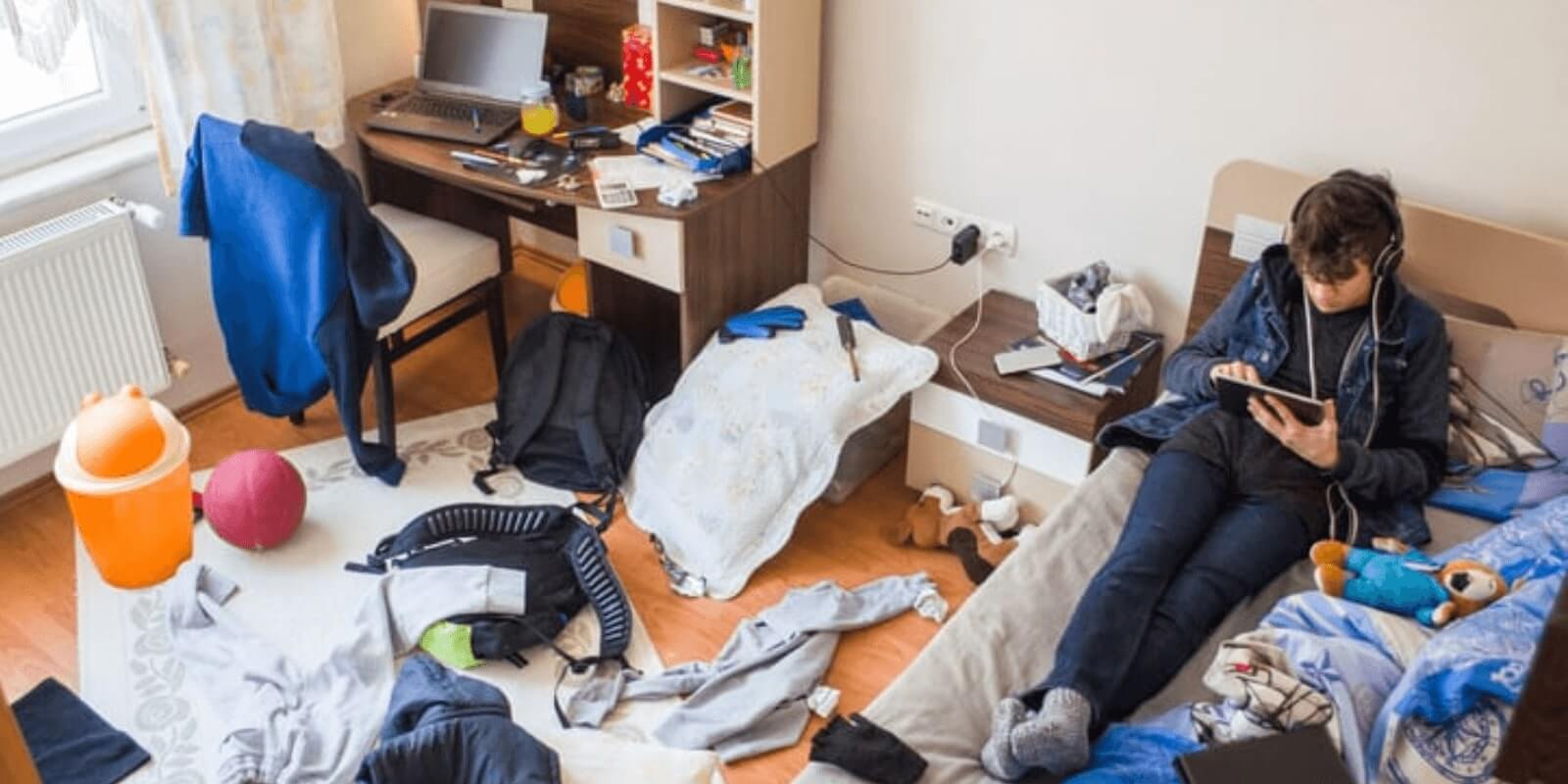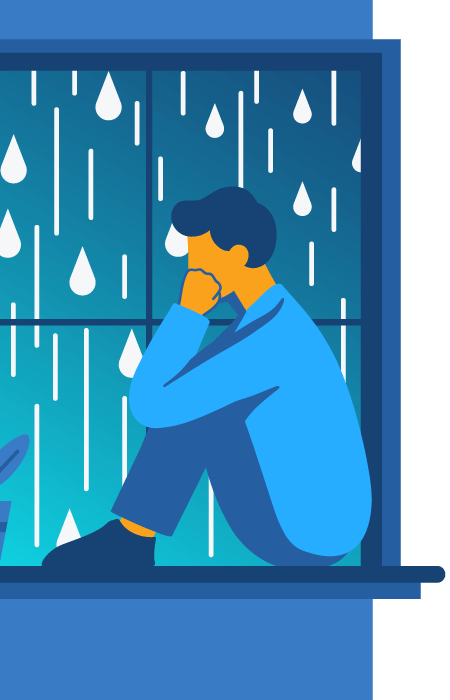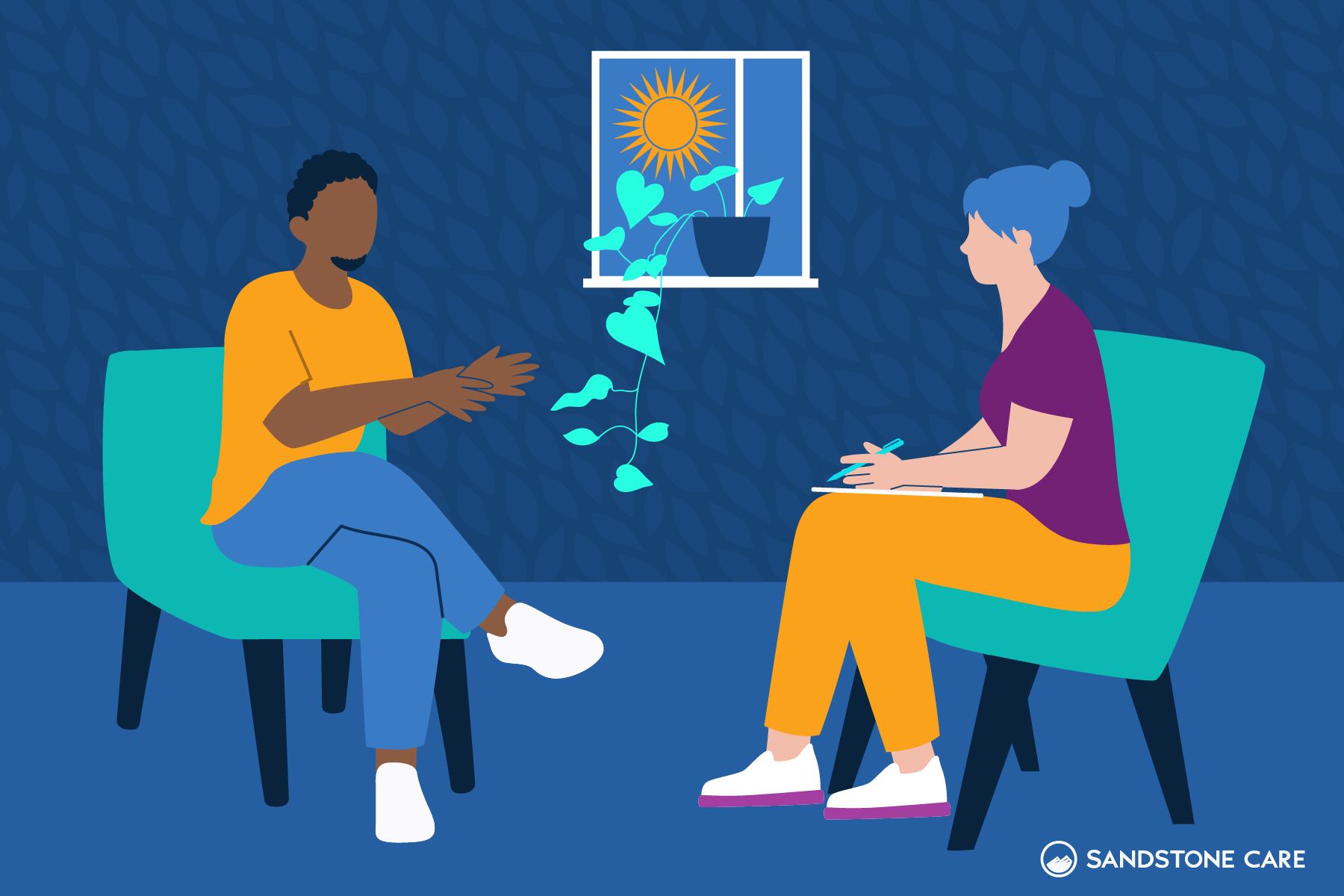#1. Is A Messy Room A Symptom Of Depression?
If your child has a messy room, they might have depression or other mental health issues.
A messy room can mean a lot of different things for your child. They might struggle with organizing and decluttering. Kids with messy rooms might also have a hard time staying on task due to other issues like attention deficit/hyperactivity disorder (ADHD).
Messiness is not always a symptom of depression. Everyone has unique expectations and preferences for their living space, which don’t always reflect your mental health. Along with a messy room, you will see other signs and symptoms of depression.
According to the Centers for Disease Control and Prevention (CDC), “3.2% of children aged 3-17 years (approximately 1.9 million) have diagnosed depression.”
Additionally, MedlinePlus states that “[o]ne in five teenagers have depression at some point.”
MedlinePlus lists the following signs of depression in adolescents, which could require professional help if they last longer than two weeks:
- Irritability or quick to anger
- Being overly sensitive to criticism
- Frequent headaches, stomach pain, and muscle aches
- No longer enjoying preferred hobbies and activities
- Tired throughout most of the day
- Feeling sad or down most of the time
- Difficulty concentrating and decreased performance in school
- Trouble sleeping, either too much or too little
- Change in appetite, either overeating or not eating enough
- Risky behaviors like promiscuity, reckless driving, vandalism, or stealing
- Alcohol or substance use
- Poor hygiene or messy appearance
- Spending more time alone and withdrawing from friends and family members
A messy room alone might not be enough for you to know if your child is depressed. However, if you see these signs along with a messy room, your child might have depression or another mental illness, like anxiety or obsessive-compulsive disorder (OCD).
In addition, a study published in Psychological Medicine on the coronavirus pandemic and its impact on mental health concluded that “the COVID-19 pandemic is having multifarious adverse effects on the mental health of youth.”
Adolescents and young adults might be more vulnerable to depression due to the mental health effects of lockdowns, social distancing, grief, and fears of the coronavirus.
During the pandemic, kids spent more time alone or away from friends than usual. They might have “nested” in their rooms. Generally, the more time your child spends in their room, the messier their rooms will become.
2. What Does A Messy Room Mean Psychologically?
Psychologically, a messy room can mean several things.
A messy room can be a sign of depression or another mental health issue. Clutter affects your mood and can cause more anxiety or stress. Your child can get caught in a cycle of messiness that worsens their mental health and vice versa.
Psychologically, a messy room can represent:
- A disorganized mind
- Feeling overwhelmed
- Difficulty letting go (common for hoarding behaviors)
- Trouble focusing on a task
- A “nothing matters” attitude (which can also include poor hygiene and a disheveled appearance)
Messiness is also sometimes linked to creativity. You might feel uncomfortable or restricted in an organized space. Teens might feel a sense of freedom when they aren’t worried about their personal space looking perfect.
Of course, the benefits of a bit of messiness and creative thinking can be quickly outweighed by the effects of clutter. A messy space can affect your mental health, mood, and even your physical health.

#3. What Is Messy House Syndrome?
Messy house syndrome, also called “Diogenes syndrome,” might be more commonly known as “hoarding.”
Those with messy house syndrome might be called “messies” or “hoarders.” They struggle to clean up or declutter their home due to underlying physical or mental health issues. Messy house syndrome presents in older adults, usually 60 and over.
People with messy house syndrome cannot maintain a healthy household. They hoard large amounts of useless objects within their homes. Often, their homes are so cluttered that they are inhabitable and unsafe.
Some mental health issues associated with this syndrome include:
- Schizophrenia
- Obsessive-compulsive disorder (OCD)
- Dementia
- Major depressive disorder
- Substance abuse disorders
Messy house syndrome is a behavior that results from an underlying mental illness in older adults who live alone. They might be unable or willing to ask for help from others to keep their homes organized and clean.

#4. What Does A Messy House Say About A Person?
Having a messy house can say a few different things about a person.
Sometimes, messiness is subjective. You might have different expectations of cleanliness based on your upbringing and personality type. Messiness becomes an issue when your mental health, safety, or physical health are negatively affected.
Most often, a house that is so messy that it is unsafe or unlivable is a sign of an underlying mental health issue.
While you might judge others for “laziness” when their homes are messy, they often do not want to live this way. They likely have no support to treat their mental illness or any family members to help. No one would want to hoard so many objects that their home is unsafe.
Clutter affects a person’s mental health. Many people with messy homes are caught in a cycle. They can’t keep a tidy home due to their mental health, and their living conditions negatively affect their mental health.
A clean and organized house can help people feel better about themselves, enhance their state of mental health, and improve their overall wellbeing.

#5. Why Does A Clean House Feel Good?
A clean house can feel good because your living environment can both reflect and impact your mental health.
A clean house takes time and energy. To clean your home, you need the energy to organize your space and care enough to put effort into the upkeep of your home. You might feel good after cleaning your home because you accomplished something.
You might even find the act of cleaning itself to be therapeutic. Cleaning up gives you a sense of satisfaction and physical activity. Organizing your personal space to suit your needs is an act of respect towards your own well-being.
A cluttered home can feel overwhelming. You might become overwhelmed with disorganization. Cleaning up your space can help you feel more in control of your environment, improving your mental health.
Depression and mental health issues take up a lot of energy and time. When you don’t have these issues, a clean house might reflect your inner state of mental health.
A clean house might feel good simply because having a clean home means that you feel good.
Teaching your child to keep their space clean and organized can help them avoid getting into a cycle of having clutter affect their mental health. Cleaning your space is an act of self-care symbolic of taking care of yourself, both mentally and physically.

#6. Is A Messy Room A Sign Of Teen Mental Health Problems?
A messy room could signify teen mental health problems and can also be “normal” teenage behavior.
You might run into issues asking your kids to pick up after themselves. They might yell, “it’s my room!” They might have different preferences than you do and are trying to have some control over their space.
Your teenager might be rebelling against your expectations or testing your limits. Limit testing can be expected for teenagers. You might believe that they are a “messy person,” and they might feel like you are judging them.
You might need to respect their space and understand that you might have different expectations of cleanliness. Some people have personalities or high expectations of themselves. What is messy to you might just be disorganized to your teenager.
A little bit of messiness might be normal for your child. Creative kids might be more inclined to feel comfortable in a less organized space. Teens might feel a little more relaxed in their room when they don’t need to keep everything “perfect.”
However, a messy room can be a sign of an underlying mental health problem.
Although most kids need reminders or help to keep their space clean, having a messy room can be a sign of mental health problems. Additionally, clutter and messiness can affect their mental health.
Overall, the difference between everyday messiness and an underlying issue can be determined by considering the following:
- Is there any rotting food or dirty plates that make the room unsanitary?
- Is it difficult to walk around piles of clothes or other possessions all over the floor?
- Are there safety issues, like clutter on or near heaters or blocking exits and windows?
- Does the room have a strong odor?
When your child’s health or safety is a concern, and they don’t seem to care, they might have a mental health issue driving their behaviors. A messy room alone is not usually enough to determine a disorder.
A messy room might accompany other behaviors or symptoms of mental health disorders like these:
- Obsessive-compulsive disorder (OCD)
- Anxiety
- Depression
- Attention-deficit/hyperactivity disorder (ADHD)
- Alcohol and substance use disorder
It is best to consider if there have been any changes in your child’s behavior. For example, if your child is usually neat and organized but suddenly stopped picking up after themselves, they might be dealing with stress or significant changes.
Mental health issues often follow a challenging life event. If you notice your teenager beginning to struggle with cleanliness, something might have happened that is distressing to them.
MentalHealth.gov states that “because children often can’t understand difficult situations on their own, you should pay particular attention if they experience:
- Loss of a loved one
- Divorce or separation of their parents
- Any major transition—new home, new school, etc.
- Traumatic life experiences, like living through a natural disaster
- Teasing or bullying
- Difficulties in school or with classmates”
When you see a behavioral change in your child following significant life events, they might not know how to cope. If you see signs of depression or other mental illnesses, it is essential to understand what might be triggering these symptoms.
Substance and alcohol use can also create a “nothing matters” attitude in your teenager, contributing to a messy room. Alcohol and drug use can also be a sign of an underlying mental health issue. Your child might drink or use drugs to “self-medicate.”
According to HealthyPeople.gov, “In 2017, the rate of alcohol or illicit drug use in the past 30 days among adolescents aged 12–17 years was 13.8%.”
The coronavirus pandemic has likely contributed to these numbers increasing in 2020. Young people might have used alcohol and drugs to cope with isolation, grief, and other negative feelings about the pandemic.

#7. Why Is It So Hard For Young Adults With Mental Illness To Clean Their Room?
Young adults with mental illness struggle to clean up their rooms due to the symptoms of their mental illness.
Mental illness can be draining. When your thoughts are running out of control, or you spend most of your day trying to look happy, you expend a lot of energy. When your teenager gets home from school, they might be too tired to do any cleaning.
Symptoms of mental illness can also make a person feel like they have no future. They might feel like they have much more significant problems in comparison to a messy room. They might think, “what’s the point of keeping my room clean? It won’t fix my real problems.”
Young adults with mental illness might hide the state of their living space from others due to shame about their mental health.
Sometimes, young adults know that they need help yet are too ashamed to reach out. They might feel too overwhelmed to start organizing and need help. Yet, due to stigma and shame, they don’t ask for the help that they need.
As a parent, you can offer to help. Often, parents might get upset or think that their kid is lazy. Instead, collaborate with your child to help them clean up their space and praise them for any efforts that they make.

8. How Can I Clean My Room When I’m Depressed?
You can clean up your room when you’re depressed, which can improve your mood and symptoms.
While cleaning a messy room won’t cure your depression, your personal space is one thing you have some control over. Depression often makes you feel like you have no control over anything in your life. Cleaning your room can be empowering and relieve some symptoms.
Use the following tips to clean up your room when depressed:
- Start small:
- Trying to clean an overly messy room all at once can be so overwhelming that you don’t even start.
- Instead, pick one thing that you can do today, like making your bed, clearing your desktop, emptying a wastebasket, or bringing dirty dishes to the sink
- Use a timer:
- Set a timer to stay on-task and then take a break.
- If you feel overwhelmed or struggle to stay on task, set your time for just five or ten minutes.
- Take breaks:
- Between tasks or timed cleaning sessions, give yourself a break.
- You can set a timer for your break as well and alternate between cleaning and break time.
- Set a definite end time:
- You might think, “I’ll get all of this done today,” and then find that the task takes longer than you thought.
- Give yourself an end time to work until and then stop for the day.
- Even just an hour each day can add up throughout the week!
- Find a way to make it enjoyable:
- You might have music or a familiar show playing in the background to provide entertainment as you clean.
- Just be careful not to get too distracted.
- Minimize other distractions:
- Turn social media notifications off from your phone or other devices.
- Let others, like family members, know that you will be busy and ask that they do not disturb you unless you ask for help.
- Get help:
- You might be ashamed to ask for help cleaning your room.
- Learning that it is okay to ask for help is a skill that will help you cope with stress throughout your life.
- Remember that other people in your life care about you, and most will be happy to lend you a hand or even just keep you company as you clean up.
Often, when depressed, you might see everything as overwhelming. Cleaning your room can feel like a daunting and impossible task. Feeling overwhelmed is a symptom of depression, which can make any activity feel like it is “too much.”

If you start small, manage your expectations, and reach out for help, you’ll realize that things aren’t as overwhelming as you thought.
Cleaning your room can teach you a lot about dealing with anxiety, stress, and other challenges. If you struggle with depression, anxiety, or other mental health issues, cleaning up a messy room can make you feel better.
You might feel like everything in your life is spiraling out of control. By cleaning up your room, you can get a sense of control in your home and build positive momentum toward moving forward in treating your mental health issues.
A messy room might be a sign that your teenager is dealing with depression, anxiety, substance abuse, or other mental health issues. Sandstone Care is here to support teens and young adults with substance use disorders. Call (888) 850-1890.






